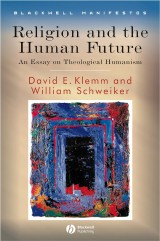Details

Religion and the Human Future
An Essay on Theological HumanismWiley-Blackwell Manifestos, Band 26 1. Aufl.
|
34,99 € |
|
| Verlag: | Wiley-Blackwell |
| Format: | |
| Veröffentl.: | 30.01.2009 |
| ISBN/EAN: | 9781444304763 |
| Sprache: | englisch |
| Anzahl Seiten: | 216 |
DRM-geschütztes eBook, Sie benötigen z.B. Adobe Digital Editions und eine Adobe ID zum Lesen.
Beschreibungen
This powerful manifesto outlines a vision called theological humanism based on the idea that that the integrity of life provides a way to articulate the meaning of religion for the human future. <ul> <li>Explores a profound quest to understand the meaning and responsibility of our shared and yet divided humanity amidst the uncertainty of modern society</li> <li>Articulates the idea that human beings are mixed creatures striving for integrity not only trying to conform to God's will</li> <li>Sets forth a dynamic and robust vision of human life beyond the divisions that haunt the humanities, social sciences, theology, and religious studies</li> </ul>
Acknowledgments. <p>Introduction.</p> <p><b>Part I The Shape of Theological Humanism</b>.</p> <p>1. Ideas and Challenges.</p> <p>2. The Humanist Imagination.</p> <p>3. Thinking of God.</p> <p>4. The Logic of Christian Humanism.</p> <p>5. On the Integrity of Life.</p> <p><b>Part II The Task of Theological Humanism.</b></p> <p>6. Our Endangered Garden.</p> <p>7. A School for Conscience.</p> <p>8. Masks of Mind.</p> <p>9. Religion and Spiritual Integrity.</p> <p>10. Living Theological Humanism.</p> <p>Notes.</p> <p>Index</p>
"There is no doubt this is a great book. . . the place to finish this review is with admiration and respect. This book will shape key debates for many years to come. It is a remarkably clear statement of a program and vision, which stresses integrity, reason, and generosity. For this service to the church and the academy, we should be deeply grateful." (Conversations in Religion and Theology, November 2010)<br /> <br /> <p>"<i>Religion and the Human Future</i> provides an excellent, well thought-out and well documented analysis of the current dilemma facing religions and religious people: the human dangers and inadequacies of hypertheism, with its exaggerated response to the challenge of modernity and over humanization, with its overly unreflective veneration for modernity." (<i>Ethical Perspectives</i>, July 2010)"This text sounds a clarion call to change the debate about the role of religion in human life. ... With limited endnotes and an engaging style, this carefully argued text mostly succeeds in its attempt to be accessible to a wider audience that could include upperlevel undergraduates." (<i>Religious Studies Review</i>, September 2009)</p>
<b>David E. Klemm</b> is a Professor in the Department of Religious Studies at The University of Iowa. He is the author of a number of books, including <i>Hermeneutical Inqui</i>ry, volumes I and II (1986), <i>The Hermeneutical Theory of Paul Ricoeur: A Constructive Analysis</i> (1983), and is co-editor of <i>Figuring the Self: Subject, Absolute, and Others in Classical German Philosophy</i> (1997), and <i>Meanings in Texts and Actions: Questioning Paul Ricoeur</i> (1993). <p><b>William Schweiker</b> is Edward L. Ryerson Distinguished Service Professor of Theological Ethics at the University of Chicago and Director of the Martin Marty Center. He is the author of numerous books, articles and essays, including <i>Theological Ethics and Global Dynamics: In the Time of Many Worlds</i>, and editor of <i>The Blackwell Companion to Religious Ethics</i> (both Wiley-Blackwell, 2004).</p>
Ours is a time when cultures and religions creatively interact but also often collide, and human power increasingly endangers forms of life even while great technological advances enable us to better relieve suffering and want. It is a time of great uncertainty, unrest, but also creativity, which reveals a profound quest to understand the meaning and responsibility of our shared and yet divided humanity. It is this religious quest for humanity that authors David E. Klemm and William Schweiker address in this Blackwell Manifesto.<br /> <p>The authors outline a vision called theological humanism based on the idea that neither God's will nor human flourishing alone provide an adequate measure and orientation for human life. The task of human life is responsibility for the integrity of life, the measure of human action. Yet more than that, the idea of theological humanism articulates a profound and ancient insight too often lost in the current debate between theologians and humanists - that human beings are mixed creatures striving for wholeness and integrity.<br /> </p> <p>This powerful manifesto sets forth a dynamic and robust vision of human life beyond the divisions that haunt the humanities, social sciences, theology, and religious studies. It announces a way of thinking about and living out the quest for our humanity and thus the task of religion and the human future.</p>
"This is a very impressive book which works its way through a wide range of serious issues with a poise and balance that is rare in academic books. It is well informed and wise, weighing in on contentious intellectual problems without being judgmental and sectarian and is unique in both acknowledging and articulating the inevitable ambiguity of religion."<br /> –<b>Dale Wright,</b> Occidental College, CA<br /> <p>"At a time when discourse about religion seems polarised between fideistic theism and reductive secularism, Klemm and Schweiker provide an imaginative "third way," in the form of a robust theological humanism that draws on and transforms the rich resources of theological and humanist traditions. This is an indispensable book that takes us beyond the stalemates of the present into a truly hopeful future grounded in human responsibility for the integrity of life."<br /> –<b>Joseph Prabhu,</b> California State University, Los Angeles</p> <p>"This essay on Theological Humanism is a welcome and powerful reminder that the primary task of theology is to explore the truth about divine-human relationship - and not to justify the ends and means of particular religious (or secular) institutions or 'communities'. Theological Humanism is committed to critical and self-critical thinking about the potential of human beings to mature in God's universe where the integrity of all life is respected. This manifesto offers a new orientation for theology today."<br /> –<b>Werner G. Jeanrond,</b> University of Glasgow</p>


















